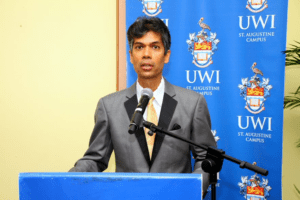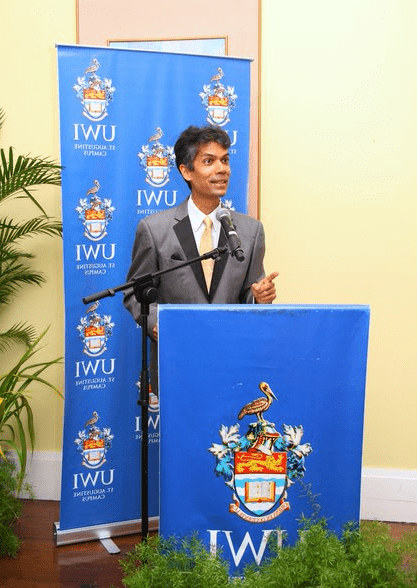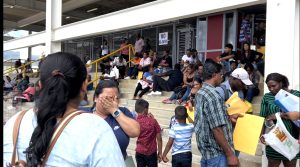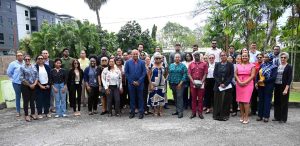
THE association of Caribbean men with violence is partly the result of a historical past of slave rebellions and revolts during slavery and indentureship.
Thus, masculinity in the Caribbean was crudely constructed and shaped from a history of slavery, indentureship, imperialism, colonialism and racism.
The male is entrapped in a vicious cycle of social problems and stigmas that originated during slavery and eventually became entrenched in the psyche of society. Despite the marked history of violence, there is a noteworthy aura of self-control in the Caribbean.
Michael Moore’s award-winning documentary Bowling for Columbine exposed a toxic love-hate relationship that United States has with guns and violence. It seems farcical that after shootings in schools, suicides and violent crimes in the US, there are distraught parents and communities wondering why and how the tragic event occurred.
It seems obvious, for logical-thinking and sane persons, that children and teenagers constantly fed a daily diet of violence will eventually mimic these acts.
Heavy metal rock songs carry satanic and xenophobic messages. Young and impressionable minds, without proper parental guidance, will become believers of the “junk”, “garbage” and “trash” that are glorified and highly praised in the foreign media.
The Caribbean male was socialised into believing that his masculinity was defined in sexual and physical terms.
Thus, the distorted framework led to deficiencies in character that are reflected in an irresponsible, uncaring and violent male. Even though there were significant contributions by Caribbean men in all spheres of life, the overarching image of the radical, rebellious, deviant and politically unstable male has become part of the distorted image of masculinity.
This status is worsened when the US media portray men as the perpetrators of the most vile crimes. This has tarnished all men as being guilty of crimes against women. For instance, the Lifetime Movie channel which frequently air movies depicting men as culprits of domestic violence, deceitful, conniving, prone to infidelity, and easily capable of murder. It has resulted in an inferiority complex among some Caribbean men.
Despite the highlighting of successful and talented Afro-Americans during Black History Month in February, the US media tended to portray Afro-Americans in a negative light. The strong influence of the media is obvious as Caribbean teenagers idolize certain actors and artistes.
Lyrics in the music of Afro-American rappers such as Snoop Dogg, Ice T, Lil Wayne and Tupac Shakur coupled with movies as Boyz N’ Hood and Juice have glorified violence against the police, use of illegal drugs, sex and violence. Even parodies as Don’t Be a Menace to South Central While Drinking Your Juice in the Hood provide little help for those needing positive messages. Such negativity has a tremendous impact on the youths in the Caribbean, especially the unemployed and those in the lower class residing in slums and ghettos.
We could ask- have these US artistes, with alternative tunes and messages, reinforced a skid row with Black hobos and bums with unfulfilled dreams who continually blame others for their circumstances. Some of these deviants pattern themselves on gangs depicted in the US movies.
The television series, Basketball Wives, which premiered in 2010, chronicles the lives of girlfriends and wives of basketball players and coaches. This provides little positive food for the audience. Middle-class and urban West Indian Blacks tend to idolise such Afro-American actors as Lawrence Fishburne, Morgan Freeman, Will Smith and Denzel Washington.
Black-ish, the television series, has some stereotypes but might have done some damage control to the image of Black America.
The multiple sexual abuse allegations coupled with civil and criminal lawsuits against Michael Jackson had a negative impact on his fans and supporters in the Caribbean.
It has resulted in some Caribbean youths being trapped in an ideology of victimhood in which they blame Whites (and others) as intent on humiliating and embarrassing Blacks. But the real tragedy of the downfall of prominent Blacks as Michael Jackson and Bill Cosby is the decline of role models for many Blacks.
Dr Jerome Teelucksingh is an activist. He initiated the inaugural observances of International Day for the Elimination of Violence Against Men and Boys (January 31) and World Day of the Boy Child (May 16). He has made academic presentations at tertiary institutions including Harvard University and Oxford University.
See other articles by Dr Jerome Teelucksingh on AZP News:
Is Monogamy Encouraged in the Caribbean
Naps Girls: From Humble Beginnings to Excellence
US Media Creates Cultural Dependency in the Caribbean
Bloodless Revolution to Save Lives in Developing Countries
The Need for a Social and Moral Revolution
The Law of Supply and Demand in Developing Countries
End the Dependency for Developing Countries
T&T Carnival and the Emperor’s New Clothes
The Influence of Labour on Caribbean Integration
The illusion of political Unity
Presbyterians in Trinidad: Humble Missionaries, Local Workers
Religious Plurality: Curse or Blessing
Caribbean Youth Need Optimism, Patriotism
Rethinking Identities in Caribbean, Latin America
November 19: All Inclusive International Men’s Day
Should International Agencies be Blamed for Unemployment
A Need to Observe Word Unemployment Day
An Ideology for the Trade Union Movement
The Man who Couldn’t be Prime Minister
Social Outburst vs Social Revolution
Challenges of the Men’s Movement
If George Floyd was Denied Parole
The Meaning of Indian Arrival Day in T&T
International Men’s Day – A Way of Life
Wounds that cause school violence
May Day: A Time for Solidarity, Strength
Who Coined the Term ‘Black Power’
The illusion of political Unity
Presbyterians in Trinidad: Humble Missionaries, Local Workers
Religious Plurality: Curse or Blessing
Caribbean Youth Need Optimism, Patriotism
Rethinking Identities in Caribbean, Latin America
November 19: All Inclusive International Men’s Day
Should International Agencies be Blamed for Unemployment
A Need to Observe Word Unemployment Day
An Ideology for the Trade Union Movement
The Man who Couldn’t be Prime Minister
Social Outburst vs Social Revolution
Challenges of the Men’s Movement
If George Floyd was Denied Parole
The Meaning of Indian Arrival Day in T&T
International Men’s Day – A Way of Life
Wounds that cause school violence
May Day: A Time for Solidarity, Strength
Who Coined the Term ‘Black Power’
![]()














